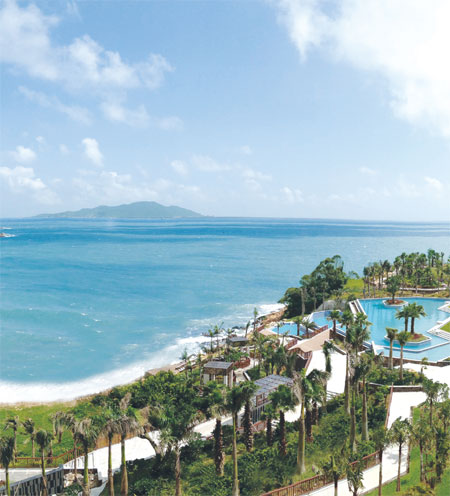Club Med chases China market
Club Med, the French company known for its resort vacation packages, has its sights on the Chinese tourist like many other international travel companies, and by 2015 it hopes that China will become its second-biggest customer base after France, according to Club Med's North American CEO Xavier Mufraggi, who spoke to China Daily on Club Med's China strategy.
Earlier this month Club Med opened its third resort property in China on Dong'ao Island in the South China Sea, and is set to open two more by 2015, bringing the total number in the country to five. The company, known for pioneering the "all-inclusive resort", is hoping to attract 200,000 people from greater China in two years' time, up from the 45,000 in 2012 when it began targeting China as part of its international expansion, according to Mufraggi.
The company has faced stagnation from its European clients due to a recession, and China, along with Brazil and the US, is helping offset that slump, said Mufraggi.
"We see that Chinese, Brazilian, Canadian and the American tourists compensate for the stagnation in Europe. Even now, more than compensate," he said. The company opened its first Chinese resort in 2010, 60 years after its founding, and currently has headquarters in Shanghai.
Today, Club Med's top-five customers come from France, Belgium, the US and the UK, with Canada and China both tied at five. In about two years, Club Med expects that the top-three spots will shuffle, with China coming after France and before the US, according to Mufraggi.
"The market in Europe is flat but not growing as it used to. We see real growth coming from China and from Brazil, where we also have foothold," he said.
The Chinese have long enjoyed traveling in groups and will eventually begin to tailor their travel itineraries to make their trips unique to the traveler, but at the moment, the all-inclusive style of traveling is a "great way for the [Chinese] market to develop itself," Mufraggi said.
"When we see lots of studies, [we see that] many of our clients don't speak other languages outside of Chinese and for them, the all-inclusive concept is really well done because the transport is organized, the transfer is organized," he said.
Chinese travelers have different expectations than those from Europe, Mufraggi said, wanting to experience as many things as possible, cramming their schedules with sightseeing, shopping and other activities.
"I think people from China want to test [out] as much as they can. They don't have that many holidays, so it's a big investment for them and they expect to do so many things. That's why the all-inclusive is great because it offers them all that possibility," he said.
Chinese customers are the No 1 visitors to Club Med's resort properties at Kani on the Maldives Island, Phuket in Thailand, and Albion on Mauritius Island.
Now Club Med is primarily targeting the top 2 percent of China's wealthiest, especially those with families, devoting training resources to teach staff how to take care of Chinese children. Club Med staff working at properties that see a big number of Chinese customers are also learning basic phrases and words in Chinese, as well as offering Chinese food options.
"[There are] families with 3-year-olds or 5-year-olds, so we also need to be able to speak the languages, and also be careful because education and the culture of taking care of kids in all the countries around the world is very different," Mufraggi said. "So not only are we staffed [with people who] speak the language, we need all our staff to be trained on all the different cultures."
amyhe@chinadailyusa.com
|
Club Med opened its latest resort on China's Dong'ao Islands, hoping that the Chinese will be its second-biggest consumer base by 2015, behind the French. Provided to China Daily |



















